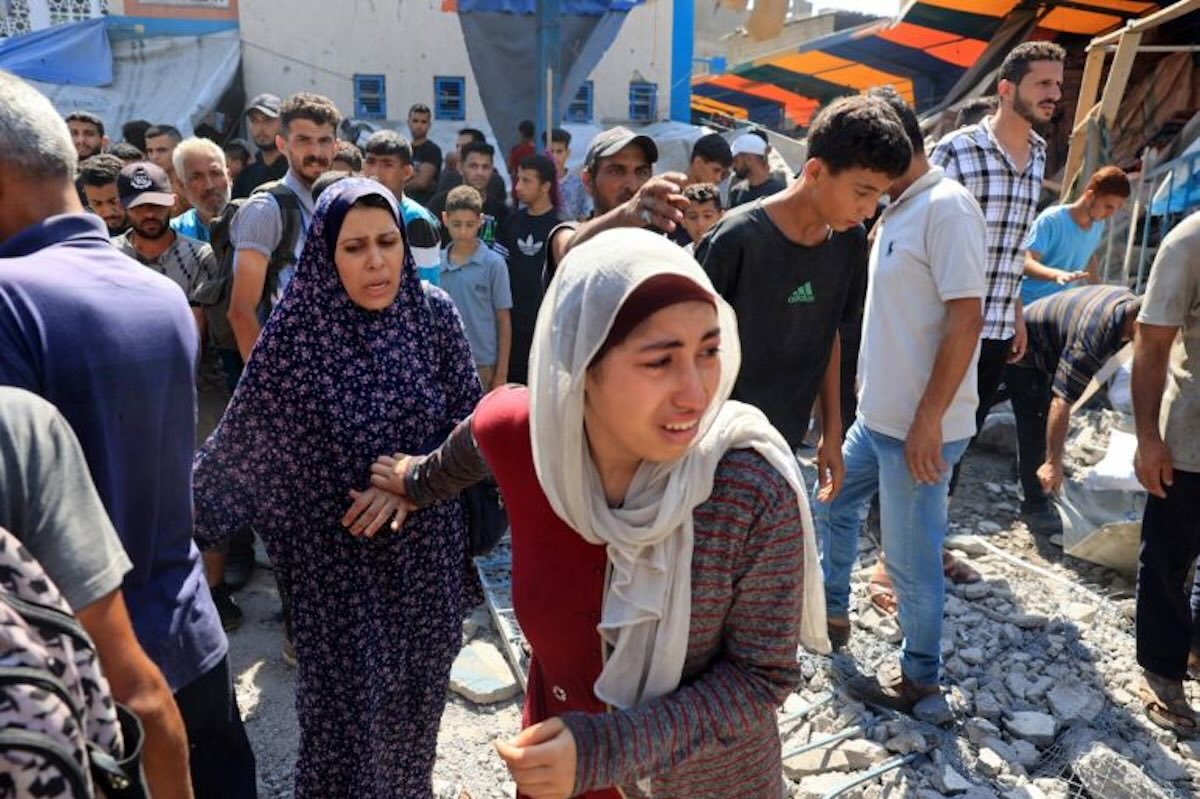
While the worlds’ attention was diverted by the attempted assassination of Donald Trump, Israeli forces have been attacking schools including a UN-run school in Nuseirat camp, where they killed 17 and wounded about 80, mostly women and children.
Israeli forces have attacked five separate schools in Gaza in just eight days, killing dozens of people sheltering in them, according to Palestinian officials, medics and rescuers.
The latest attack on Sunday struck the United Nations-run Abu Oreiban school in the Nuseirat refugee camp, killing at least 17 people and injuring about 80. Most of the victims were women and children, said Palestinian Civil Defence.
Al Jazeera’s Hani Mahmoud, reporting from Deir el-Balah’s Al-Aqsa Martyrs Hospital, where some of those injured were brought, said he encountered severely burned women and children “crying out in pain and agony” on the floor.
“This is the result of incinerating bombs,” he said.
The assault came after a deadlier strike hit tents near the entrance to Khan Younis’s al-Awda school on July 9, killing at least 29 people.
Two days before that, another strike on the church-run Holy Family school in Gaza City killed four people.
The bloodshed in Gaza’s schools-turned-shelters, which Israel accuses Hamas of fortifying, has been a recurring scene throughout the war.
Israel has repeatedly attacked civilian buildings after accusing Palestinian fighters of using them for military purposes but it has provided no proof for its claims. Campaigners have accused Israel of disproportionate use of force against civilians in Gaza. More than 38,600 people, most of them women and children, have been killed in nine months of relentless bombardment.
On Saturday, Israel struck al-Mawasi area, designated as a safe zone, killing at least 90 people and injuring 300 others.
“Massacres every day everywhere in Gaza,” said Palestinian Ambassador to the UK Husam Zomlot after the latest school attack. “This is the result of Israel’s impunity and international inaction.”
Since launching the war on October 7, Israel has hammered more than 400 schools in Gaza, which are among the few places displaced Palestinians can turn to for shelter, destroying 88 percent of all educational facilities.
With the enclave’s education system decimated, there is little hope of enrollment for some 620,000 school-age Palestinians who are out of school.
A June report by the UN Human Rights Council (OHCHR) found that Israel’s repeated attacks on civilian infrastructure, including schools, appear to be violations of international law.
“Civilian lives and infrastructure are protected under international humanitarian law,” said OCHCR chief Volker Turk. “This law lays out the very clear obligations of parties to armed conflicts that make protection of civilians a priority.”
“Israel’s choices of methods and means of conducting hostilities in Gaza since October 7, including through the extensive use of explosive weapons with wide area effects in densely populated areas, have failed to ensure that they effectively distinguish between civilians and fighters.”
In January, the International Court of Justice said Israeli attacks in Gaza plausibly amounted to genocide.
On top of wrecking most of Gaza’s schools, Israeli attacks have destroyed 60 percent of the enclave’s homes, 80 percent of its commercial shops and 60 percent of its roads.
![[Irish Republican News]](https://republican-news.org/graphics/title_gifs/rn.gif)
![[Irish Republican News]](https://republican-news.org/graphics/title_gifs/harp.gif)

